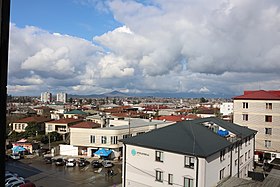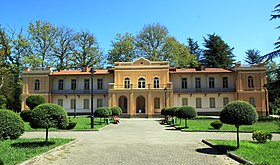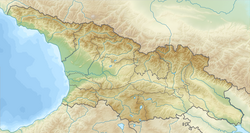Zugdidi
Zugdidi
ზუგდიდი | |
|---|---|
| Coordinates: 42°30′30″N 41°52′0″E / 42.50833°N 41.86667°E | |
| Country | |
| Mkhare | Samegrelo-Zemo Svaneti |
| District | Zugdidi |
| Area | |
• Total | 21.8 km2 (8.4 sq mi) |
| Elevation | 100 m (300 ft) |
| Population (January 1, 2024)[1] | |
• Total | 40,100 |
| • Density | 1,800/km2 (4,800/sq mi) |
| Time zone | UTC+4 (Georgian Time) |
| Postal code | 2100 |
| Website | www |
Zugdidi (Georgian: ზუგდიდი; Mingrelian: ზუგდიდი or ზუგიდი) is a city in the western Georgian historical province of Samegrelo (Mingrelia). It is situated in the north-west of that province. The city is located 318 kilometres west of Tbilisi, 30 km from the Black Sea coast and 30 km from the Egrisi Range, at an elevation of 100–110 metres above sea level. Zugdidi is the capital of the Samegrelo-Zemo Svaneti region, which combines Samegrelo (Mingrelia) and upper part of Svaneti, and the centre of the Zugdidi Municipality within. Zugdidi is the sixth most populous city in Georgia.
The city serves as a residence of the Metropolitan of Zugdidi and Tsaishi Eparchy of the Georgian Apostolic Autocephalous Orthodox Church.
Etymology
[edit]The name "Zugdidi" (ზუგდიდი) first appeared in the 17th century. Literally it means "big hill" in the Mingrelian language (from ზუგუ zugu, 'hill'; დიდი didi 'big'). An alternative version of the name recorded in old sources is "Zubdidi" (ზუბდიდი) with the same meaning as Megrelian. Local Georgian (Megrelian) residents of the historical provinces of Megrelia and Abkhazia also use "Zugidi" (ზუგიდი), which is a shortened form. The name was given to the town because of a hill situated in the eastern part of the city, where some small remains of an ancient fortress are still visible.
History
[edit]Historically Zugdidi was the capital of the Principality of Mingrelia (Odishi) until 1867 when the principality was abolished by the Russian Empire. After that Zugdidi was an administrative centre of Zugdidi Uyezd as a part of the Kutais Governorate until 1918 when it became a part of the Democratic Republic of Georgia. From 1930 the centre of the Zugdidi Raion of the Georgian Soviet Socialist Republic and then Independent Georgia (from 1991).

Between the 17th and 19th centuries, Zugdidi was one of the important political and cultural centres of Mingrelia and the whole of Georgia. A famous Georgian medieval epic poem The Knight in the Panther's Skin has been rewritten by Mamuka Tavakalashvili here at the court of Prince Levan II Dadiani in 1646.

During the Crimean War (1853–1856) Ottoman forces with Omar Pasha seized Zugdidi in 1855. At the end of the 1855 and beginning of 1856 city was liberated by the Mingrelian Militia commanded by Major General Prince Grigol Dadiani. By the order of Iskender Pasha, Ottomans plundered, burnt and destroyed the whole city, especially palaces and botanical garden.[2] During the Russian Empire, the city was the administrative center of the Zugdidi Uyezd of the Kutaisi Governorate. Many buildings were heavily damaged during the Georgian Civil War 1992–1993 as well.
In 1993, there was located administration of the first president of Georgia Zviad Gamsakhurdia and the Supreme Council of the Republic of Georgia as well.
Architecture and landmarks
[edit]Dadiani Palace
[edit]Dadiani Palace, built in the 19th century, was home to the final ruling family of the Principality of Samegrelo. The complex includes the palace of Ekaterine Dadiani of Samegrelo; a residence for her son, Niko Dadiani; a monastery; and what is now the Zugdidi Botanical Garden. Today, the palace operates as a museum and is open to visitors. It underwent renovations from 2015 to 2018.[3][4]
Botanical Garden
[edit]Zugdidi Botanical Garden was established in the 19th century by the Prince of Mingrelia David Dadiani and Queen Ekaterine, near the residential palaces. Currently, the garden is a branch of Tbilisi Central Botanical Garden and is administered by the Georgian Academy of Sciences. The garden covers 26 hectares.
Shalva Dadiani Zugdidi State Academic Drama Theater
[edit]This theater's first performance, Molière's Le médecin malgré lui (The Doctor Despite Himself), was staged on 11 April 1869 by Anton Purtseladze. The Drama Theater was founded in 1932. in 1959 the theatre was named after the famous Georgian novelist and theatrical actor Shalva Dadiani (1874–1959).[citation needed]
Other landmarks
[edit]Climate
[edit]Zugdidi has a humid subtropical climate (Cfa) under the Köppen climate classification.
| Climate data for Zugdidi (1991–2020, extremes 1981-2020) | |||||||||||||
|---|---|---|---|---|---|---|---|---|---|---|---|---|---|
| Month | Jan | Feb | Mar | Apr | May | Jun | Jul | Aug | Sep | Oct | Nov | Dec | Year |
| Record high °C (°F) | 22.7 (72.9) |
24.2 (75.6) |
30.9 (87.6) |
36.1 (97.0) |
38.2 (100.8) |
40.0 (104.0) |
42.4 (108.3) |
39.9 (103.8) |
40.4 (104.7) |
35.6 (96.1) |
29.7 (85.5) |
26.4 (79.5) |
42.4 (108.3) |
| Mean daily maximum °C (°F) | 10.7 (51.3) |
11.8 (53.2) |
15.1 (59.2) |
20.0 (68.0) |
24.0 (75.2) |
27.3 (81.1) |
29.0 (84.2) |
29.8 (85.6) |
26.8 (80.2) |
22.6 (72.7) |
16.9 (62.4) |
13.0 (55.4) |
20.6 (69.0) |
| Mean daily minimum °C (°F) | 2.0 (35.6) |
2.3 (36.1) |
5.0 (41.0) |
8.3 (46.9) |
12.9 (55.2) |
17.1 (62.8) |
19.7 (67.5) |
20.0 (68.0) |
15.7 (60.3) |
11.3 (52.3) |
6.3 (43.3) |
3.6 (38.5) |
10.4 (50.6) |
| Record low °C (°F) | −10.0 (14.0) |
−10.9 (12.4) |
−10.7 (12.7) |
−2.2 (28.0) |
1.5 (34.7) |
8.0 (46.4) |
12.1 (53.8) |
10.1 (50.2) |
4.8 (40.6) |
0.0 (32.0) |
−3.8 (25.2) |
−7.6 (18.3) |
−10.9 (12.4) |
| Average precipitation mm (inches) | 140.8 (5.54) |
132.0 (5.20) |
173.0 (6.81) |
128.5 (5.06) |
142.4 (5.61) |
196.7 (7.74) |
171.0 (6.73) |
147.2 (5.80) |
149.8 (5.90) |
177.3 (6.98) |
145.5 (5.73) |
142.8 (5.62) |
1,847 (72.72) |
| Average precipitation days (≥ 1.0 mm) | 12.1 | 11.4 | 13 | 10.8 | 9.8 | 9.3 | 8.6 | 8 | 8.6 | 10 | 10.4 | 10.8 | 122.8 |
| Source: NCEI[5][6] | |||||||||||||
Demography and population
[edit]Historically Zugdidi is known as a distinctly mono-ethnic city with a vast majority of Georgians. By the 2002 state census, 98.97% (166,039) of its total population (167,760) were ethnic Georgians (for both city and municipality).[7]
In the second half of the 1850s, due to the short Ottoman occupation, the town population decreased from 2000 to 800.
The 1950s-1970s were an important period for Zugdidi's development, which affected the growth of the population, while the last 20-year growth was mainly caused by refugee displacement. After the Russian-Georgian war in Abkhazia (1992-1993) a large number of internally displaced peoples from Abkhazia were forced to move to Zugdidi. As a result of this, according to the 2002 state census, Zugdidi became the fifth most populous city in Georgia, ahead of Sokhumi, Poti, and Gori. As of the 2014 national census, the population of Zugdidi decreased to 42,998 inhabitants, making it Georgia's sixth most populous city after Gori.[8]
Historic population of Zugdidi:[9][10][8]

| Year | Total | Male | Female |
|---|---|---|---|
| 1851 | 2,000 | --- | --- |
| 1863 | 800 | --- | --- |
| 1886 | 1,078 | --- | --- |
| 1897 | 3,407 | 2,129 | 1,278 |
| 1917 | 4,000 | --- | --- |
| 1922 | 4,525 | --- | --- |
| 1926 | 5,577 | 2,843 | 2,734 |
| 1939 | 15,062 | 7,394 | 7,668 |
| 1959 | 31,081 | 14,119 | 16,962 |
| 1970 | 39,896 | 18,610 | 21,286 |
| 1979 | 45,170 | 20,988 | 24,182 |
| 1989 | 50,022 | 23,551 | 26,471 |
| 2002 | 68,535 | 31,312 | 37,223 |
| 2014 | 42,998 | 19,746 | 23,252 |
| 2023 | 41,332 | --- | --- |
Education
[edit]Zugdidi is a regional center of education. Institutes of higher education are:



- Shota Meskhia State Teaching University[11] – the main institution of higher education founded in 2007 on the basis of Zugdidi Branch of Ivane Javakhishvili Tbilisi State University, Zugdidi Professional Lyceum and Senaki Agro-economic College. The university has three faculties of Humanitarian, Business Administration and Law and Health.
- Zugdidi Teaching University European Academy,[12] founded in 1991
Besides this Zugdidi has 13 public and 3 private schools, as well as kindergartens.
- Alexander Gurtskaya Gymnasium – GG[13] – one more place of interest and unique educational space. Was founded in 2011, on the basis of a Presidential Decree instead of former Public School No.7. Today, GG is an innovative educational environment where each individual has a wide selection, capability and motivation of intellectual, physical and spiritual development and wonderful opportunities for achieving success in the global competitive society. The Gymnasium welcomes its students and guests with its unique, original facade, which is made of randomly spaced books on the shelves.
Library tradition in Zugdidi dates back to the reign of Prince (Mtavari) David Dadiani (1812–1853) of Mingrelia, who collected a large number of handwritten and printed books. The first public library in Zugdidi was established in 1887. After this, in 1899 new reading room was rearranged, which turned into a library in 1912 with its own building.[14] Currently, the library is called Zugdidi City Municipal Library.

Annual events
[edit]
Vlakernoba
[edit]The main annual event in Zugdidi is Vlakernoba (Georgian: ვლაქერნობა - The day of the Blachernae's Virgin Mary) - an Orthodox Christian feast celebrated every year, on July 15. On this day, the robe of the Blessed Virgin Mary is taken from the Tower of Virgin of the Queen Palace (now a museum), where it is kept, to the Cathedral of the Blachernae Icon of the Mother of God. During the feast, thousands of the faithful from all over the world are able to venerate the holy relic upon the conclusion of the Divine Liturgy.
From 2012, during the event, the holy robe was carried into the new cathedral of Iberian Theotokos. Vlakernoba is celebrated since the 1990s.
Zugdidoba
[edit]Zugdidoba (Georgian: ზუგდიდობა - the day of Zugdidi) is a newly reestablished public festival, featuring various cultural, sport and educational events in Zugdidi, mostly in October. The festival is managed both by Zugdidi Municipal City Hall and Zugdidi Municipality Government.
Sports
[edit]The main association football team in the city is FC Dinamo Zugdidi founded in 1919. Other, amateur, football clubs are FC Mglebi Zugdidi and FC Odishi 1919. American Football Club "Western Bad Boys"
Notable people
[edit]- Niko I Dadiani (1847–1903), Prince of Mingrelia
- Salome Dadiani (1848–1913), Georgian princess, the only sister of Niko Dadiani
- Andria Dadiani (1850–1910), Georgian nobleman and a chess player
- Otar Patsatsia (1929–2021), 3rd Prime Minister of Georgia (1993–1995)
- Nona Gaprindashvili (1941–), chess player, the sixth women's world chess champion (1962–1978), first female Grandmaster
- Otar Gabelia (1953–), retired football player, goalkeeper of FC Dinamo Tbilisi and Soviet Union national football team
- Davit Narmania (1979–), former mayor of Tbilisi, the capital of Georgia
- Bacho Akhalaia (1980–), politician who was Minister of Internal Affairs of Georgia
- Davit Kiria (1988–), Georgian kickboxer who competes in the Lightweight division
- Ika Meporia (1989–), professional footballer[15]
See also
[edit]- Zugdidi Municipality
- Dadiani Palaces History and Architectural Museum
- Zugdidi Botanical Garden
- Samegrelo-Zemo Svaneti
References
[edit]- ^ "Population by regions". National Statistics Office of Georgia. Retrieved 28 April 2024.
- ^ Proceedings of Zugdidi State Historic and Ethnographic Museum, volume 1 (in Georgian). Zugdidi. 1947. pp. 101–102.
- ^ Guthrie, Samantha (2018-07-03). "Dadiani Palace in Zugdidi Finishes Renovations". Georgia Today. Retrieved 2020-02-23.
- ^ "19th Century Dadiani Palace complex undergoes vital restoration". Agenda.ge. Retrieved 2020-02-23.
- ^ "World Meteorological Organization Climate Normals for 1991–2020-Zugdidi-37279" (CSV). National Centers for Environmental Information. Retrieved 18 March 2024.
- ^ "World Meteorological Organization Climate Normals for 1981–2010". National Centers for Environmental Information. Archived from the original on 9 October 2021. Retrieved 9 October 2021.
- ^ "Unsere Artikel Uploads". ECMI - Fitness Magazin aus Georgien.
- ^ a b "2014 General Population Census Main Results General Information" (PDF). National Statistics Office of Georgia. Retrieved 2 May 2016.
- ^ Russian Empire and Soviet Census for 1897, 1926, 1939, 1959, 1970, 1979, 1989 (in Russian)
- ^ "2002 General Population Census Major Findings" (PDF). National Statistics Office of Georgia. Retrieved 10 May 2016.[permanent dead link]
- ^ "შოთა მესხიას ზუგდიდის სახელმწიფო სასწავლო უნივერსიტეტი". www.zssu.ge.
- ^ "Გრიგოლ ხვიტიას ზუგდიდის სასწავლო უნივერსიტეტი". Archived from the original on 2016-10-02. Retrieved 2018-09-04.
- ^ "GG-SCHOOL".
- ^ "ზუგდიდის მუნიციპალიტეტის ბიბლიოთეკების მართვის ცენტრი".
- ^ Ика Мепория: "Когда выходишь на поле – волнение пропадает…" (in Russian). UA-Футбол. 2010-07-07. Retrieved 2010-07-07.
External links
[edit] Zugdidi travel guide from Wikivoyage
Zugdidi travel guide from Wikivoyage- Website of Zugdidi Municipal City Hall
- Website of City Council of Zugdidi Municipality










